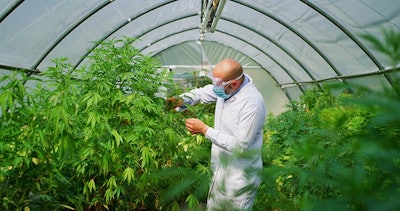
The Drug Enforcement Administration (DEA) announced Aug. 26 that it will take steps to expand the scientific and medical research of cannabis, pledging to approve additional federal cultivation licenses from a pool of applications that have been pending since 2016.
The agency submitted a filing in the Federal Register Monday indicating that it “intends to promulgate regulations” to evaluate the dozens of cultivation license applications that have been submitted by private entities wishing to grow cannabis for FDA-approved research. These applications were filed in response to the DEA’s 2016 announcement that it would begin accepting additional cultivation licenses, although not a single application has been approved in the past three years.
The total number of individuals registered with the DEA to conduct cannabis research, on the other hand, has increased by more than 40 percent over the last two years, according to a DEA press release. In response, the agency has increased cannabis production at the University of Mississippi, the only organization currently licensed by the DEA to grow cannabis in the U.S. for research purposes.
In June, Dr. Sue Sisley and a group of researchers from the Scottsdale Research Institute (SRI) in Phoenix sued the DEA, arguing that the quality of cannabis produced at the University of Mississippi is sub-par and preventing them from conducting meaningful research. The SRI team was one of the dozens of applicants that applied for a cultivation license in 2016, and its lawsuit demands to know why the DEA has ignored the applications.
 DEA cannabis research applications
DEA cannabis research applicationsLast month, the U.S. Court of Appeals for the District of Columbia ordered the DEA to explain why it has not responded to the applications it has received from prospective growers. The DEA was given until Aug. 28 to respond, and Monday’s announcement seems to be the answer the cannabis industry was waiting for.
“I am pleased that DEA is moving forward with its review of applications for those who seek to grow marijuana legally to support research,” said Attorney General William P. Barr, in a public statement. “The Department of Justice will continue to work with our colleagues at the Department of Health and Human Services and across the Administration to improve research opportunities wherever we can.”
“DEA is making progress in the program to register additional marijuana growers for federally authorized research, and will work with other relevant federal agencies to expedite the necessary next steps,” said DEA Acting Administrator Uttam Dhillon, also in a public statement. “We support additional research into marijuana and its components, and we believe registering more growers will result in researchers having access to a wider variety for study.”
The DEA’s Aug. 26 announcement also indicates that since the 2018 Farm Bill federally legalized hemp, individuals do not need to register with the DEA when using hemp plants and hemp and CBD products in research, as long as the THC content remains at or below 0.3 percent.
The DEA does not provide a timetable on when it will issue the regulations concerning the evaluation of the pending cultivation applications, however, which has left some industry stakeholders frustrated.
“For the past three years, the DEA has failed to take any steps to follow through on its promise to facilitate clinical cannabis research, and today’s announcement makes it clear that this foot-dragging will continue,” NORML Executive Director Erik Altieri said, in a public statement. “According to the DEA’s filing, the agency has yet to even evaluate even one of the dozens of applications before it—many of which have been pending for more than two years—nor do they provide any timetable regarding when or if they ever will. In an era where public and scientific interest in the cannabis plant, particularly with regard to its therapeutic properties, has never been greater, and where patients in a majority of states are already using cannabis in compliance with state law, it is inexcusable that the DEA continues to take this ‘head-in-the-sand’ approach to this rapidly changing cultural and legal landscape.”
In any case, MMJ BioPharma Cultivation announced Aug. 26 that it received notice from the DEA that its cultivation application is being processed for approval.
According to a company press release, the notice sent to MMJ BioPharma Cultivation states that the “DEA intends to propose regulations in the near future that would supersede the 2016 policy statement and govern persons seeking to become registered with the DEA to grow marijuana as bulk manufacturers, consistent with applicable law.”
Similarly, MedPharm Research, a cannabis research and formulation development company, announced Aug. 27 that it also received word from the DEA that the company has been selected to move forward as one of the first applicants to be granted a license to grow federally legal cannabis.
In a letter to MedPharm CEO Albert Gutierrez, the DEA stated that the company will be issued a Notice of Proposed Rulemaking, where MedPharm will be asked to comment on regulations regarding the cultivation of cannabis for medical research, according to a company press release. The press release does acknowledge that the DEA did not provide MedPharm with a timetable on when those regulations might be completed, however.
“This is something we have been waiting for since we first sent in our application in September, 2016, as one of the first medical grow facilities to apply for a license,” said Gutierrez, in a public statement. “Now, finally, the DEA has seen the importance of allowing federally legal grows to get more active in medical cannabis research, and do the work that we really need to do for patients across the country. It is a real game-changer for the whole medical cannabis industry."

























